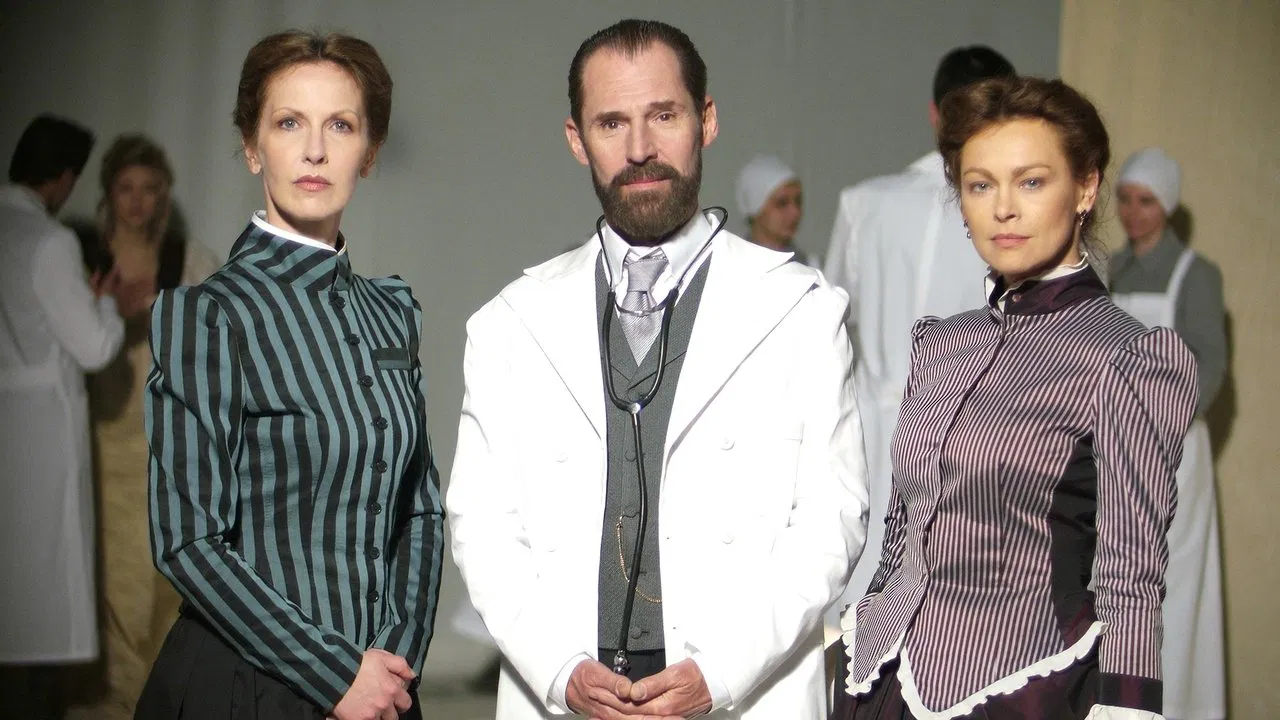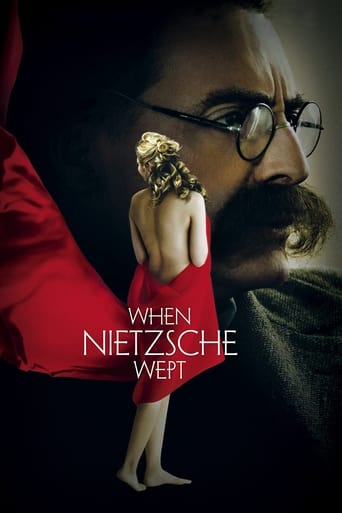ChampDavSlim
The acting is good, and the firecracker script has some excellent ideas.
Brooklynn
There's a more than satisfactory amount of boom-boom in the movie's trim running time.
Logan
By the time the dramatic fireworks start popping off, each one feels earned.
Kirpianuscus
adaptation of a book who gives more ideas than scenes. opportunity for Armand Assante to give a role who is far to be easy for the melodramatic way imposed by script. short, a nice try to give a story who has special beauty. the only sin - for this hard work , the director has not the right tools. and this did the film decent if you ignore the not reasonable tone from few scenes. "When Nietzsche wept" is the genre of book perfect for read it and not imagine versions of adaptation. this is the explanation for the sins of the film - the desire to say what only the silence gives.
funkyfry
Anybody who has read the fascinating and controversial works by German thinker Friedrich Nietzsche is going to want to at least see how it looks to actually have Nietzsche as a flesh and blood person walking around town going about his business. The fact that Nietzsche is played by Armand Assante shouldn't really be too much of a turn-off, because although it might not be the kind of role we associate with Assante he's always been a decent and dedicated actor.The story is one of those fictional/historical conceits, wherein Friedrich Nietzsche ends up influencing the psychology of Sigmund Freud by way of his association with Lou Salome (potentially true) and Jacob Breuer (not true). In such matters, I'm not such a stickler for "accuracy" but more like accuracy of feeling or idea. Did the film present these characters in such a way as they would have interacted? And so on a scale of 1 to 10 where a 10 represents Salieri and Mozart's relationship and 1 represents Teddy Roosevelt falling in love with Sacajaweah, I guess this movie is maybe a 6 or a 7.But the big surprise of the movie is just how excellent Ben Cross is playing the role of the frustrated doctor Breuer, going through a mid-life crisis and dealing with his own neuroses as a means of bringing Nietzsche out of his shell (basically attempting to get Nietzsche to self-diagnose). His facial expressions, the way he acts out his frustrations with Nietzsche and then tries to hold equal ground as an objective and unemotional intellectual when he's with Freud, is fascinating. During the final sequence of events when he watches the woman he's obsessed with (Michal Yannai) declaring love for another, and is embarrassed to be found beardless waiting tables, his performance reaches rare heights of comic mania.Unfortunately there is bad casting on display as well, in the female leads. Joanna Pacula is the only female member of the cast to hold her weight, and she's not given a lot to do. Yannai is mixed, pulling off most of a very difficult role. But Katheryn Winnick is a terrible actress, saddled here as well with a Russian accent, and she seems imposed on the film for eye candy. The film fails to portray her as someone who Nietzsche or Freud or anybody else would form an intellectual fascination with.The dream sequences, therapy/vision sequences, and hypnotism sequences are all done with fairly poor CGI, but a couple of them are well worth cherishing; particularly humorous and bizarre is the "Swan Lake" sequence.Basically this film would be a decent introduction to basic ideas of Nietzschean philosophy and Freudian psychology, and for more experienced viewers there's at least some intellectual interest in a fantasy fictional representation of the inspiration that Freud took from Nietzsche. Some parts are damaged by the low budget -- it would have been best not to attempt to visually depict any of Nietzsche's "Zarathustra", if the best they were going to do was something that looks like a History Channel re-enactment. But the film is worth watching for Cross' surprising and engaging performance and Assante's not surprising but almost equally engaging performance.
lastliberal
Josef Breuer and Sigmund Freud did work together and they did collaborate on a book about Anna O, who was most likely Bertha. Lou Salome did have relationships with Nietzsche and Freud and many others. All of these things are true.But, Breuer did not treat Nietzsche. That is in the author's (Irvin D. Yalom) imagination, and what a great imagination it was. The story makes a super philosopher seem human, with frailties that we all suffer. It also makes for an interesting story of how psychoanalysis came about. I can imagine that it really did develop this way as Breuer and Feud discovered what worked and what didn't. We see free association or "chimney sweeping" as Bertha called it, we certainly see transference, and much more as the discipline developed.Ben Cross was excellent, Armand Assante gave the best performance I have ever seen from him, Jamie Elman let us see Feud as a young man, Katheryn Winnick certainly makes me want to see her again, and Michal Yannai was delightful.A great period piece that will delight all who care about philosophy and psychology.
lynch-26
I rented this DVD having seen it while looking for something else. When I saw the title on the jacket I couldn't believe my eyes. I read Yalom's book about a year ago and loved it, in fact admire Yalom's work in general. (I am a clinical psychologist.) I have watched perhaps 30 minutes of this movie and have had to turn it off. I'm not sure if I can take much more. At a superficial level, the faux accents, as others have commented, are simply distracting at best and irritating and vapid at worst. The acting is dull when it should be passionate and comical when it should be serious. The portrayal of Lou Salome is simply flippant, and the brilliant Freud comes off as little more than a schoolboy. I see very little of the book's spirit conveyed thus far. I had hoped to be able to recommend this film to my students. Instead, I will refer them to the book. Imagine that.


